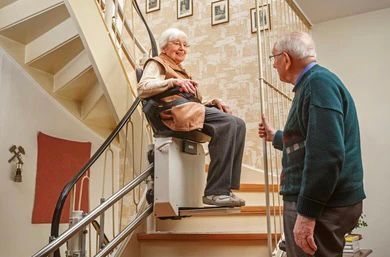FINDING A GOOD PERSONAL CARE WORKER (Part 4) - How to interview a personal care assistant

If you’ve read the third part of our "Finding a Good Personal Care Worker" blog series, you’ll already know what qualities you should be looking for in a personal care assistant but you’ll need to be sure on the person you hire; to do so, we urge you to interview them. Interviewing is a vital part of the process because it gives you the opportunity to iron out all your reservations and be sure the applicant you are looking at is really right for you.
Whether you’re the interviewer or the interviewee, meeting someone new and interviewing well can be a nerve-wracking experience - for most people. So, first of all, take comfort in the fact that you are not alone and consider the person in the chair across from you is probably feeling the same way you are, to begin with.
When arranging, for the first time, to meet a personal care assistant whose profile you like the look of, on ‘paper’ or on our UKCIL site, it’s important to arrange to meet in a public place, perhaps a local café, that is away from your home but convenient and easy to find for both of you. This will be safer than bringing a stranger to your home for the first time and who knows, it may even help calm everyone’s nerves. Try to choose somewhere quiet, at a not-so-busy time of the day, because you want to be able to hear each other talk. This is also a good time to ask the PA to bring along things like their references, their DBS certificate, and their driving licence - whichever is appropriate to the role you’re trying to find someone for.
Based on our experience of helping hundreds of individual employers independently and directly find, meet and hire personal care assistants that are right for them, we would also advise you to make a list of questions before your arranged meeting. Aim to write them down in the early stages that you are reviewing the personal care assistant’s profile. Remember some questions may be different for one carer versus another, so it’s ok to have one master set of questions and a few specific to each carer you are meeting. Writing them down in a handy place means you add to the list on the go, jotting down things, as you remember them, before the day you meet your applicant - plus it means you won't forget your questions when you meet up and have the “ah-I-wish-I’d-asked-about-that!” moment afterwards.
All questions you put together will act as your interview questions, giving you time to think about the personal care assistant’s replies, as well as giving the PA opportunity to express themselves, their personality and their experience. Being prepared like this will give you the capacity to really concentrate and make a good judgement on whether the person you are meeting is right for you.
There are several types of questions you may ask - both direct and indirect. For instance, an indirect question, asking the PA about their lifestyle, family, and interests will tell you if they have the time to work flexible hours for you (e.g. if that is a requirement because you need them to stay on a bit longer at the end of their working day sometimes) or if they seem too busy to be able to do that for you. Direct questions may relate to the PA’s work history, asking them why they believe this opportunity suits them, or what they think they can bring to this role.
You can also create questions based on different scenarios so that you know what they would do in certain situations - say for instance if you can pass out sometimes, ask them what they would do if that were to happen and they were alone with you. A clear answer will usually be a good indication of someone who has experience. If the person is lacking in confidence, don’t write the PA off - it may be that they just don’t have as much experience; so look to assess whether they have compassion and are willing to learn, because that will go a long way in helping you take the first steps with someone new, someone who may end up being a very reliable PA to you.
Finally, it’s important to close your meeting well, especially if you like the PA. For one, tell them you have enjoyed meeting them if this is the case and be clear about when you’ll be in touch with an answer - be honest; tell them if you need to see someone else before you make your decision, but just be clear on timelines around when you’ll be in touch. Of course, remember to close the meeting by thanking the person for their time and suggesting that if he/she has any other questions, they can message or call you, whichever is more convenient to you - this keeps your lines of communication open.
UKCIL wants to see individual employers successfully meet the personal care assistants they are really looking for - independently and directly. Our tools help you to do this quickly and easily. To find out more, please visit www.ukcil.com.




